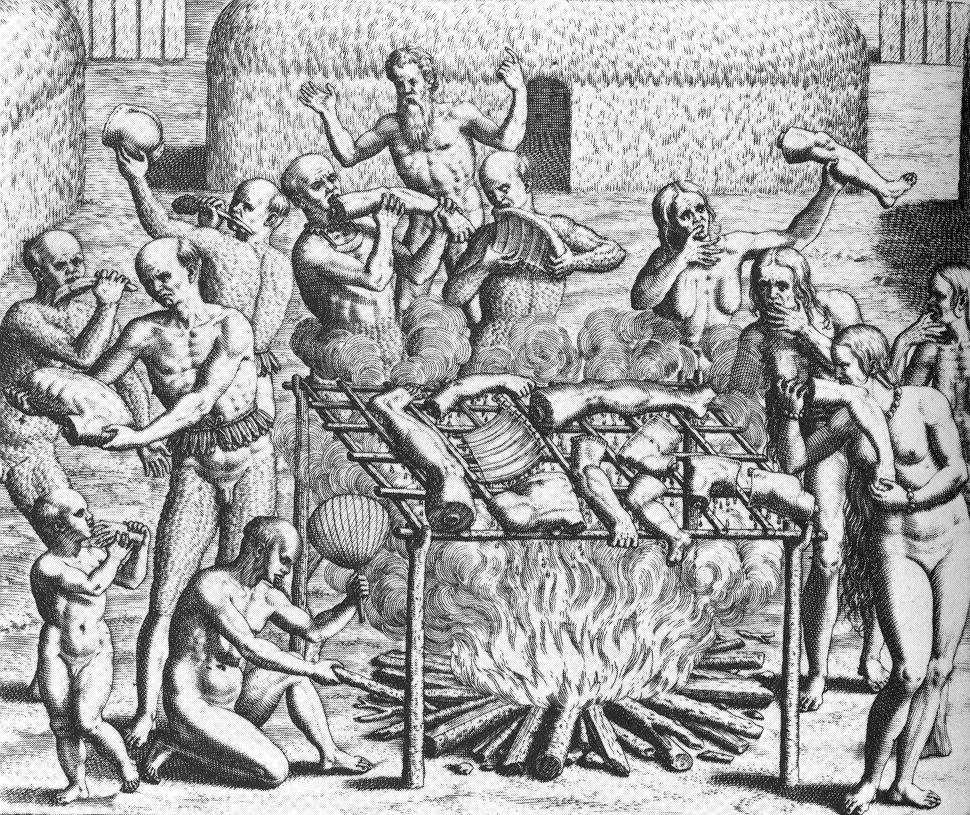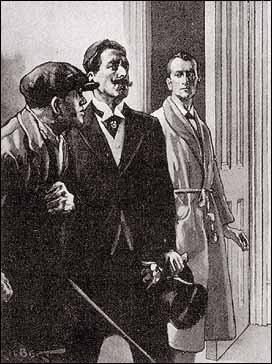
invious
adj. having no roads; trackless

invious
adj. having no roads; trackless
I’ve mentioned this elsewhere, but I hadn’t realized the source was known: In 1844, British general Sir Charles Napier was criticized in Parliament for his ruthless campaign to take the Indian province of Sind. On hearing this, 16-year-old schoolgirl Catherine Winkworth “remarked to her teacher that Napier’s despatch to the Governor General of India, after capturing Sind, should have been Peccavi (Latin for ‘I have sinned’).”
She sent this immortal pun to Punch, which unfortunately printed it as a factual report:

This mangled its meaning and credited Napier. Winkworth’s authorship was discovered only by later literary sleuths.
orbity
n. a bereavement by loss of parents or children
reme
v. to cry out in grief or pain; to lament
philostorgy
n. parental love
asperous
adj. harsh to the feelings; bitter, cruel, severe
Of August Friedrich Schenck’s 1878 painting Anguish, one critic wrote in Figaro, “All the world today regards Schenk as one of our first animal-painters. He is one of those originals, of a species not yet extinct, who prefer dogs to men, and find more sweetness in sheep than in women.”
“It is a little drama, this picture, and as poignant as if it had men for actors and victims.”

cicurate
v. to tame, to render mild
caniculture
n. the rearing of dogs
naufrageous
adj. in danger of shipwreck
ridibund
adj. inclined to laughter; happy, lively
metagrobolize
v. to mystify
In January 2004 Greg Clark was making a supply run from his home on Kosciusko Island in southeastern Alaska when he radioed that his boat had lost power. With him was his constant companion, Brick, an 8-year-old Labrador retriever. After a three-day search, the Coast Guard found part of the boat’s stern on rocks on the west side of the island, which lies within the 17-million-acre Tongass National Forest.
More than a month afterward, two local fishermen were motoring past Heceta Island, several miles from the accident, when they saw a black animal on the beach. They recognized Brick, who swam to the boat and was hauled aboard. He was underweight, his leg was injured, and his fur was matted with tree sap, but he was “wiggling with joy,” according to CBS News. How the dog had stayed alive for four weeks in the harsh Alaskan winter is unknown.
any-lengthian
adj. unscrupulous
anythingarianism
n. the fact or phenomenon of not holding any fixed or established beliefs
anamnesis
n. the recalling of things past; recollection, reminiscence
alogism
n. an illogical or irrational statement or notion
eutaxy
n. good order or management
satisdiction
n. saying enough
In “The Adventure of the Six Napoleons,” a hotel manager successfully finds a man’s name in his ledger at Sherlock Holmes’ request even though he knows only the first name.
“I should like to have seen the index to that pay-list,” remarked the Holmes commentator James Edward Holroyd. “How do you enter the name of a man who has no surname? As Beppo ‘X’?”
Possibly the manager used the same indexing system as Holmes himself, who in “The Sussex Vampire” looks up the forger Victor Lynch under V in his record of old cases. “Good old index,” he tells Watson. “You can’t beat it.”

longevous
adj. long-lived; living or having lived to a great age
alieniloquy
n. rambling talk
comessation
n. feasting, banqueting
ephectic
adj. suspending judgment
The Scythians always ate their grandfathers; they behaved very respectfully to them for a long time, but as soon as their grandfathers became old and troublesome, and began to tell long stories, they immediately ate them. Nothing could be more improper, and even disrespectful, than dining off such near and venerable relations; yet we could not with any propriety accuse them of bad taste in morals.
— Sydney Smith, “On Taste,” 1805
baisemains
n. respects or compliments
idoneous
adj. appropriate; suitable; proper; fit
peradvertence
n. thorough care or attention
basilic
adj. royal
At the Athens Olympics of 1896, American runner Thomas Curtis asked his French competitor Albin Lermusiaux why he was putting on white gloves before the start of the 100-meter race.
Lermusiaux said, “Because I am running in front of the king.”

orra
adj. odd; not matched
anonym
n. an anonymous person
prolocutor
n. one who speaks for another
acataleptic
adj. not knowable for certain
Ostensibly the adventures of Sherlock Holmes were recorded by his friend John Watson. But of the 60 canonical tales, two (“The Adventure of the Mazarin Stone” and “His Last Bow”) are told in the third person. Who wrote these? Sherlock’s brother Mycroft? One of Watson’s wives? Watson himself, strangely? Arthur Conan Doyle?
In The Annotated Sherlock Holmes, William Stuart Baring-Gould writes only, “There has been much controversy as to the authorship of these two adventures.”